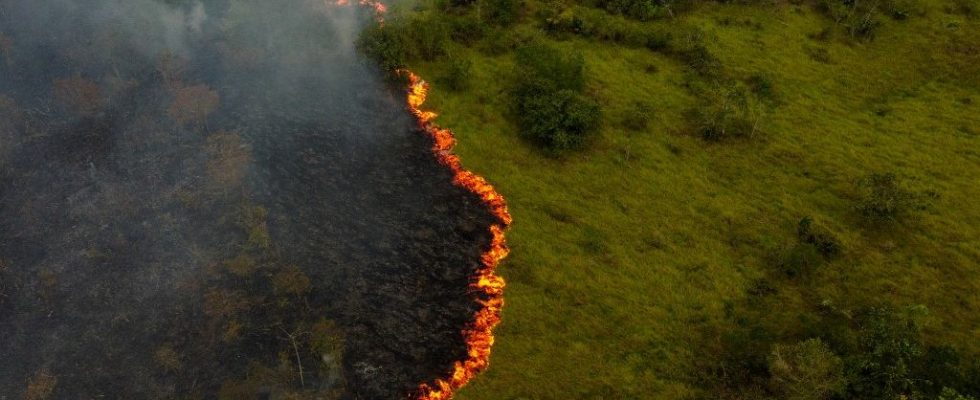Regularly in the sights of environmental NGOs, which denounce, for example, BNP Paribas’ investments in Total Energies’ oil projects, French banks have until now always escaped conviction in connection with environmental damage. But the scales of justice could soon tip for four banks. BNP Paribas, Crédit Agricole, Axa and BPCE, the joint group of Banque Populaire and Caisse d’Epargne, are targeted by a complaint from the Sherpa association for “money laundering and receiving stolen goods” linked to “illegal deforestation ” in Brazil. A first.
Why was this complaint filed with the National Financial Prosecutor’s Office in Paris? What are the money laundering accusations based on? Can such a complaint lead to the banks being convicted? 20 minutes make the point.
Why is the complaint filed in France?
The Penal Code is clear on financial offenses: the place of the offense is that “where the decision was taken, where the head office is located” of the company concerned, explains to 20 minutes Jean-Philippe Foegle, litigation and advocacy officer at Sherpa. Thus, in the case of these four French banks, “the competent judge is the French judge”.
The Sherpa association, which has the possibility of filing a civil suit on behalf of victims of economic and ecological crimes, has therefore taken responsibility for filing a complaint with the National Financial Prosecutor’s Office. The association works to “strengthen the legal responsibility of multinational companies”, in particular through “strategic litigation and advocacy”, presents Jean-Philippe Foegle. In a press release, Sherpa indicates that it is associated in its approach with the NGOs Center for Climate Crime Analysis, Harvest, Transparency International and Reporter Brasil, an association of journalists and researchers specializing in violations of socio-environmental and labor rights in Brazil.
What is the link between French banks and illegal deforestation in Brazil?
The chronic scandal of massive deforestation in the Amazon is particularly followed in Brazil, both by the public authorities and by NGOs such as Reporter Brasil. Thus, as an epilogue to a tragic Bolsonaro era for the Amazon forest, the NGO’s investigators looked into the JBS and Marfrig groups, two behemoths of beef farming and “having a proven history of illegal deforestation, “land grabbing of indigenous peoples and forced labor in their beef supply chains,” according to Sherpa. Several investigations by Reporter Brasil between 2013 and 2021 thus prove violations of human rights and the environment by their suppliers.
According to a report from the Center for Climate Crime Analysis, more than 50% of livestock suppliers to JBS, which accounts for a quarter of the global beef market, committed irregularities in the state of Para alone between 2018 and 2021. The same for 40 % of beef suppliers to JBS and Marfrig slaughterhouses in the state of Mato Grosso. However, illegal cattle breeding is the main cause of illegal deforestation in Brazil, which is carried out through fires and wild logging. These figures clearly show the “systemic” scale of illegal breeding, underlines Jean-Philippe Foegle, who believes that “the banks could not have been unaware”. These same banks which invested nearly $70 million between 2013 and 2021 in JBS and Marfrig, for an estimated profit of $11.73 million.
To be clearer, French banks lent money, via bonds, to the two agri-food giants, whose activities are tainted by hidden supply chains, before enriching themselves when JBS and Marfrig repurchased their bonds with interest. “When we talk about money laundering, we often think of occult schemes. But it is also the fact of providing assistance in any conversion of an illegal operation,” explains Jean-Philippe Foegle. Thus, “granting a loan to a company knowing that part of the turnover comes from illegal operations is money laundering”. German and Dutch banks would also be affected by this type of opaque financing.
Can Sherpa’s complaint lead to a conviction?
This is not the first time that banks have been taken to court for their environmental responsibility. But until now, the complaints focused on “the duty of vigilance”, “difficult to implement” and whose contours present gaps, regrets Jean-Philippe Foegle. This is particularly the case of BNP Paribas, targeted at the start of the year by a complaint to the Paris judicial court. “Civil law is not dissuasive enough,” adds the advocacy officer.
Sherpa therefore raised the tone with this criminal complaint. “In terms of the evolution of the law on the offense of money laundering, we are on target,” believes Jean-Philippe Foegle. A big strong point in favor of the NGO, the prosecutor can this time launch an investigation, “including requesting documents from Brazil”. The idea: “follow the money that allows deforestation”. But nothing says at this stage that this path will lead to a condemnation of French banks.

